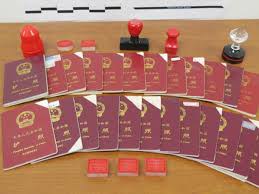Three women have each been sentenced to 18 months behind bars for their parts in a large-scale, Richmond-based immigration scam that has already sent their former employer to prison for seven years.
Jin “Fanny” Ma, Ming Kun “Makkie” Wu and Wen “Vivian” Jiang, all of Richmond, were sentenced after previously pleading guilty to several charges, including representing on immigration matters without authority, passport offences, misrepresentation, forgery and tax evasion.
As well as the jail term, each of the accused - all of whom worked for previously imprisoned Xu “Sunny” Wang at New Can Consultants Ltd. and Wellong International Investments Ltd - were fined: Ma: $96,000; Wu: $50,000; and Jiang: $74,000.
The sentencing, at Vancouver Provincial Court on Tuesday, was the result of a lengthy investigation into the activities of Wang’s two, unlicensed immigration consulting businesses offering services across Metro Vancouver.
According to the Canada Border Services Agency (CBSA), the investigation was the single, largest of its kind for immigration fraud in B.C.’s history.
From 2006 to 2013, more than 1,600 of New Can’s clients collectively paid approximately $10 million for fraudulent services — including creating the fictitious appearance of Canadian residency, forging documents and falsifying Chinese passports to help clients obtain permanent residency — the precursor to citizenship.
The CBSA’s Inland Enforcement Section has reviewed the list of clients, and is actively pursuing investigations on any person found to have misrepresented themselves through fraud or deceit in order to obtain or maintain their permanent resident status in Canada.
In May 2015, new laws granted IRCC new powers to revoke citizenship. Prior to this, a judge was required. After just 15 people had their citizenship revoked in 2014, 131 met the same fate in 2015. To June of this year, 104 cases were successfully processed, according to IRCC.
Wang’s clients were described by a federal prosecutor as “well-to-do” foreign nationals, willing to pay for fraud to get into Canada.
Wang’s activities were initially uncovered by immigration officials who found inconsistencies in his clients’ home addresses.
Last October, Wang was also found guilty of tax evasion after collecting about $10 million from his clients and not declaring his income (while collecting low-income benefits).



